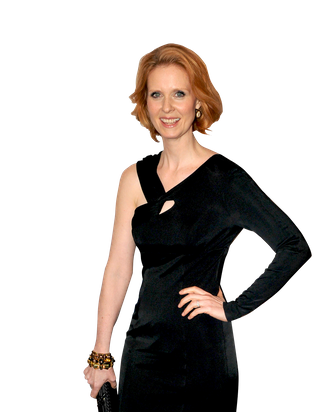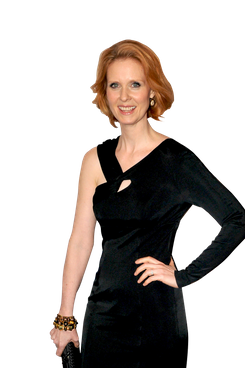

For those of you who are still just pretending to understand what caused the 2008 financial crisis, HBO delivers Too Big to Fail, an adaptation of Times reporter Andrew Ross Sorkin’s book about the near collapse of our economy. Directed by Curtis Hanson (L.A. Confidential), the movie gives a play-by-play of what guys like Hank Paulson, Tim Geithner, and Ben Bernanke were up to just before and after Lehman Brothers went bankrupt and life as we know it almost, and then didn’t, end. Portraying one of the few women inside the Wall Street/Washington huddle is Cynthia Nixon, whose turn as Michele Davis, public affairs guru to Paulson (William Hurt), is brief — but enough to make you long for Miranda Hobbes in a power suit. We spoke with Nixon, a pretty vocal Democrat, about playing a Republican, boning up on the world of banking, and Sex and the City 3.
Had you already read the book when the script came to you?
No. I’m so not a financial person. I had to reread the script four times before even accepting the job. I just couldn’t follow it. Partly because these players were new to me and on a page, it’s like, “Which one is Dick Fuld and which one is Geithner?” But I think that HBO was very smart. When you have so many recognizable faces, so many actors people know, in some ways, it makes it easier to follow. It’s like, “Oh, Billy Crudup is worried because Paul Giamatti … ” I feel like when all that was going on, it was really scary, but I had a limited understanding of it. And reading the script and making the film and watching the film all put together helps me understand a lot better what it is that really happened, and how close we came to the precipice, which I don’t think I truly understood at the time.
How did you get up to speed, then, to prepare for the role?
I read pieces of the book. I researched Michele Davis on the web and I read interviews with her and I watched what little footage there was to see of her. And then I got to have lunch with her and ask her a lot of questions.
What was that like?
It was great. They’re all really impressive people; really smart people.
Was she concerned how she’d be portrayed?
Yeah, I mean, as you can tell from the film, a lot of what she does is spin. [Laughs.] So I’m sure, of course, one would be concerned about how one would be portrayed and what the spin is on it. But I think that’s one reason she wanted to be involved, too.
She’s one of the few female players in the film. Was there any point while you were shooting where you realized, Wow, there are a bunch of men running this show?
It is interesting, and Michele Davis did talk to me about how oftentimes she was the only woman in the room, and also how she was the only one who came from public service, from the political world. Almost everybody was a man who came from private industry, and very high up in private industry. And she said the note that she most often sounded was, “We can’t just fire off a memo, we can’t just dictate, we can’t just explain what’s happening to Congress, or the American people or the president or anybody — we have to bring them along. We have to keep them informed so we don’t just shock them when we move from A to Q. We need to bring them along, and we have to — in a more female way, perhaps — reach some kind of consensus. We can’t just shoot orders.
What do you mean, “in a more female way”?
I think that men are far more cut-to-the-chase and make up their own — it’s a much more top-down system: They make up their mind about what has to happen, and then they just put out an order. I think women understand — not only women, I think Obama understands this — that if you really want a unified response to a problem, you have to make sure that everybody is on the same page, and not just because you told them to be, but because they think it’s the best thing, too.
Whether or not you knew what was going on with the financial crisis, you’re a politically active person: You must have had some sort of opinion of these guys going into the whole project.
I move in very Democratic circles. And these are very by-and-large Republican people. I mean, certainly Michele Davis is a really dyed-in-the-wool Republican and a big part of the Bush White House, which was really anathema to me. But it was interesting: I liked her so much, and I agreed with so many things that she said. It was kind of a reminder to me that the loudest parts of the Republican party are really who we hear from, and that actually, people like her, even though they’re in the Bush White House, they may think that — I mean, I shouldn’t quote her, I won’t say which new Republican faces she’s not a fan of — but … To my mind, you’re a Republican, you love all the Republicans, you love all the policies, but actually that couldn’t be farther from the truth. There are people of goodwill and enormous skill who might be on the other side of the aisle; it doesn’t mean that they’re blind to common sense or human rights.
Well, look at New York, where the lobbying campaign to legalize same-sex marriage is hugely funded by Republicans.
This is what I’m hearing more and more: That the real grassroots movement for marriage equality in New York is coming from the Republican party and the Republican people. It seemed for a while like a left-of-center issue, but it’s just not.
How do you feel Obama is doing on the issue?
I am a fan of the president, and I think people were a little anxious for him to move a little quicker, but he has a lot on his plate and he may be moving slower than we’d like, but he’s certainly moving in the right direction and taking really important, big steps.
Not to change the subject completely, but I have to ask before we go: Is there a third Sex and the City movie in your future?
If Michael Patrick King would be writing and directing it, absolutely. I have 100 percent faith in Michael Patrick King and if he feels like there’s another story to tell … I don’t want to speak for other people, but I feel like we all feel that way.

